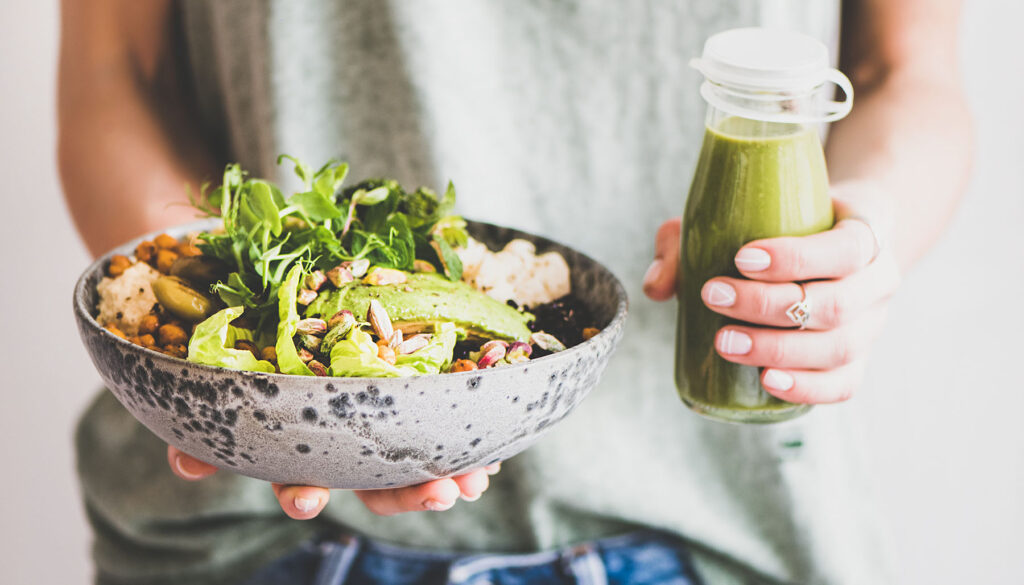If you’ve ever searched the internet for mysterious symptoms in the middle of the night–c’mon, we’ve all done it–then you know that a lot of health advice boils down to “diet and exercise.”
That can be a frustrating thing to hear. In fact, it’s sometimes downright infuriating. You know that basic stuff like eating a vegetable or going for a walk is healthy. You might have even heard that exercise releases feel-good endorphins, making a trip to the gym its own reward. Doesn’t make it any easier to load your plate up with broccoli or lace up your sneakers.
Here’s the frustrating thing, though. These experts? They’re not wrong. Eating nutritious, whole foods does make you feel better than living on take-out or microwave dinners. And exercising offers so many benefits that can improve your life in unexpected ways, including mental health.
The question is why, given how simple it is to follow this advice, so few of us actually do it? And moreover, why “diet and exercise” doesn’t always work.
Eat less and move more? Sorry, but it’s a lot more complicated than that.
This is the part where I remind you that talking to your doctor should be the first step in any lifestyle change program. Okay? Let’s get into it!

Exercise Is One (Small) Part of the Big Picture
One of the reasons that people get frustrated with exercise is that it doesn’t produce the results they want. If you’re trying to lose weight, tone your muscles, or build mass, exercise alone isn’t going to cut it. It’ll help! In fact, your exercise routine is probably doing you a lot of good, even if you’re not seeing it in the mirror or on the scale.
Diet is more important than exercise to your overall health. While going for a walk or doing yoga can help in a lot of ways, exercise can’t compensate for poor food choices. It’s part of the solution, but hopping on the treadmill isn’t going to fix everything.

Doing endless, high-intensity cardio might not be the best approach anyway. A balanced exercise plan involves lower-impact cardio, such as walking, biking, or swimming, as well as strength training and the occasional full-out, sweat-soaked burst of movement. Too much of one type of exercise can put strain on your joints or overtax muscles without giving them time to heal and get stronger.
Oh, and if you’re hunched over your desk all day (like yours truly), then twenty or thirty minutes of desperate cardio isn’t going to help as much as you might hope. Incorporating more movement throughout your day is more beneficial. That could mean getting up to walk around your home, doing five minutes of stretches, or dancing to your favorite music once an hour.
Will Someone Please Just Tell Me What to Eat?
Diets are a notoriously thorny bramble, and I’m not an expert who can recommend the perfect meal plan for you. When I first became aware of the concept of “dieting” as a kid, it was all about low-fat everything. Fat was the ultimate enemy, but making foods that still tasted good without it involved a lot of added salt, sugar, and processing.
In hindsight, not great.
The enemy now is carbs. Ask someone doing keto about–actually, never mind. Please don’t ask anyone doing keto anything unless you have at least an hour to spare. Most nutritionists will tell you that a balanced diet with an emphasis on whole foods and fresh produce is the best way to improve your health.

Folks who are trying to lose weight often fall into the trap of not eating enough. A sudden or severe calorie deficit can trick your body into thinking that there’s a famine.
Our ancestors were very good at storing energy (i.e. fat) to get us through the lean times, and if our genes think that we’re starving by accident, they send a whole bunch of signals to lower metabolism, increase appetite, and store every possible calorie so that we’ll survive the bad harvest.
Thanks, genetics!
Remember how I said that exercise wasn’t as important as diet? It’s mostly because your basal metabolic rate–the energy needed to stay alive and functional all day, every day–accounts for up to 80% of your daily calories.
In comparison, exercise barely makes a dent. That’s why your best option to create the calorie deficit needed to lose weight is your diet. But if you don’t eat enough calories, or even miss the mark on a specific nutrient such as protein, your body goes into survival mode.
And then, even if you can make slow, steady progress without triggering your natural alarm systems, your body still has one last fail-safe protection. It gets used to being whatever size you are, and it really, really doesn’t want to change. You’ll have to fight against your own survival instincts to lose weight (or gain it, although that’s slightly easier). Fun, right?
Basically, “diet and exercise” advice isn’t wrong, but it’s overly simplified to the point of being unhelpful. If you want to work on your health and well-being, then gradual lifestyle changes that focus on incorporating more movement into your day, being more mindful of your body’s natural hunger cues, and choosing whole foods over processed meals is pretty much universally accepted as being a good place to start.
That’s much harder to cram into an Instagram hashtag, though.













